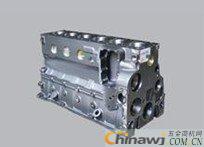**Understanding and Preventing Early Cylinder Wear in Jinan Scrap Car Engines**
Cylinder wear is a common issue in diesel engines, especially in older or poorly maintained machines. If left unchecked, it can lead to reduced performance, increased fuel consumption, and even engine failure. Below are the main causes of early cylinder wear and practical steps to prevent it.
1. **Improper Break-In Period**: New or overhauled engines must go through a proper break-in process before being used. Skipping this step can cause excessive wear on the cylinder walls, piston rings, and other internal components due to inadequate lubrication and improper seating of parts.
2. **Overloading the Engine**: Prolonged overload operation increases engine temperature, thins the oil, and reduces lubrication effectiveness. This leads to accelerated wear of the cylinder liner, piston, and piston rings. It also causes incomplete combustion, carbon buildup, and potential misfires.
3. **Long Idle Times**: Running the engine at idle for extended periods results in poor lubrication and incomplete combustion. The low temperature can also lead to acid formation, which corrodes the cylinder walls and causes pitting and spalling.
4. **Frequent Start-Ups**: Each time the engine starts, oil drains back into the sump, leaving critical components in dry or semi-dry friction. This significantly increases wear on the cylinder liner, piston, and piston rings, especially if started frequently without proper pre-lubrication.
5. **Neglecting Air Filters**: A clogged air filter allows dust and dirt, including silica particles that are harder than steel, to enter the combustion chamber. These abrasive particles accelerate cylinder wear and reduce engine efficiency.
6. **Inadequate Oil Changes**: Over time, engine oil degrades and accumulates contaminants. Failing to change the oil regularly leads to abrasive wear between moving parts, increasing the risk of cylinder damage.
7. **Fueling During Warm-Up**: Supplying fuel before the engine is fully warmed up—especially below 5°C—can cause incomplete combustion and carbon deposits. This not only hinders starting but also speeds up cylinder wear.
8. **Starting Without Preheating**: Starting the engine immediately after turning it off can result in cold, incomplete combustion. This increases carbon buildup and accelerates wear on the cylinder and other internal parts.
9. **Mechanical Faults**: Issues such as bent connecting rods, loose or tight fit parts, and misalignment can all contribute to uneven stress on the cylinder, leading to premature wear.
10. **Incorrect Lubricant Use**: Using the wrong type of oil or oil that doesn’t meet manufacturer specifications can lead to poor lubrication, overheating, and increased wear on critical engine components.
11. **"Humping the Throttle"**: Rapidly opening and closing the throttle during shutdown attempts to burn off excess oil. However, this causes uneven fuel-air mixtures, incomplete combustion, and more carbon deposits, worsening cylinder wear.
**Preventive Measures to Avoid Cylinder Wear**
1. Always perform a proper break-in period for new or overhauled engines to ensure proper component seating and lubrication.
2. Regularly inspect and maintain air, oil, and fuel filters to prevent dust and debris from entering the engine, reducing the risk of abrasive wear.
3. Replace engine oil according to the manufacturer’s recommendations, ensuring clean oil circulates properly. Clean the oil pan and lubrication system thoroughly during oil changes.
4. Avoid adding water to the engine after starting, as it can cause thermal shock and crack cylinder walls.
5. Keep the engine operating within the ideal temperature range (70–80°C). Too high or too low temperatures can both harm the cylinder and reduce engine lifespan.
6. Ensure proper pre-lubrication before starting, especially after long shutdowns. This helps reduce dry friction and protects internal components.
7. Allow the engine to warm up for a few minutes before putting it under load. This ensures full lubrication and reduces initial wear.
8. Avoid prolonged overload and continuous idling, both of which increase wear and reduce engine efficiency.
9. Minimize unnecessary start-ups and avoid sudden throttle changes. Gradual acceleration and deceleration help maintain smooth engine operation.
10. Never "bomb" the throttle, as it can damage connecting rods, crankshafts, and lead to incomplete combustion and carbon buildup.
11. Address mechanical issues promptly. Check piston ring gaps, valve clearances, and fuel injection timing regularly to ensure optimal performance and reduce wear.
12. Maintain cleanliness during maintenance. Avoid introducing foreign particles into the engine by keeping tools, parts, and the engine body clean.
By following these guidelines, you can significantly extend the life of your Jinan scrap car engine and reduce the risk of early cylinder wear. Proper care and maintenance are essential for reliable and efficient engine performance.

relief valve,Nitrogen relief valve,Self-operated relief valve,Self-operated Nitrogen relief valve,relief valve Self-operated,Nitrogen relief valve Self-operated
Jiangsu Tanggong Automatic Control Equipment Co., Ltd. , https://www.tgcontrolequipment.com